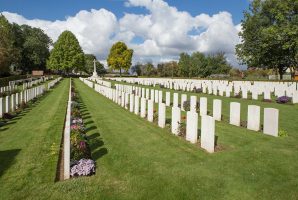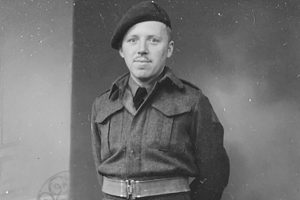By Leo Grudinski – Lethbridge, Alta.
WWII ended in Europe May 8, 1945 and was commonly known as VE (Victory in Europe) Day. At that time, I was serving in the Canadian Navy aboard a Corvette in Escort Group C4.
Our Group of Canadian ships had just completed escorting a convoy of merchant ships across the North Atlantic from Canada to England. It had been a good crossing with moderate gales, only one attack by German U-Boats, and no loss of life or ships sunk.
We turned the convoy over to a local escort group and were proceeding up the west coast of England when we were informed by radio from British Admiralty that Germany had surrendered.
Shortly after, the admiral of the German U-Boat fleet, Dönitz, ordered his U-Boats to surrender by coming to the surface flying a black flag. Why a black flag instead of the traditional white for surrender? We never did find out.
British Admiralty ordered us to accept the surrender of U-Boats and escort them to a detention pen located in North Ireland. We were surprised and shocked by the large numbers of U-Boats which surfaced and surrendered in an area through which we had fought our way through just a few days earlier.
Most surrendered without incident
We accepted the surrender of several U-Boats that day and most without incident, however, one U-Boat surfaced about 200 yards from our ship and continued to proceed at great speed, meanwhile elevating and depressing its main gun.
Not knowing the U-Boat’s intent, we in company with another Canadian ship, kept circling the U-Boat. As a precaution, our gun crews were closed up and guns trained on the U-Boat if action became necessary.
This uneasy situation continued for some time until a German sailor appeared on deck waving a black flag with great enthusiasm. The U-Boat was then escorted to the detention area.
The following day, we escorted one of the U-Boats up the Foyle River to Londonderry, North Ireland where it was berthed at a quay below the Guild Hall also known as the City Hall. The crew was taken ashore under escort and the U-Boat opened for public viewing.
In speaking to the German sailors, many of whom could speak English, they generally expressed the desire to return home as soon as possible to wives and family.
Ships blacked out
I went aboard the U-Boat later that evening and was surprised to find that anything not securely fastened down had been removed. I suppose that souvenir hunters are the same the world over. The next day we joined a convoy which had been assembled for us to escort back to Canada.
During wartime, all ships at sea, except some hospital ships, were completely blacked out, which of course led to collisions, particularly at night and during North Atlantic gales. Blackout had now been lifted and on the first night at sea with the convoy we saw the most amazing scene.
The 50 ships in the convoy were brilliantly showing their navigation and riding lights. To a boy from the Canadian prairies returning home, it was like seeing a small prairie town ablaze with light on a Saturday night.



